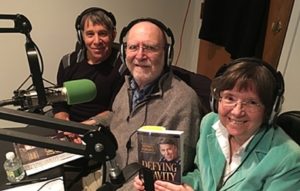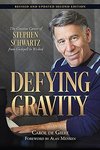Biography, Creativity, and Stephen Schwartz: Interview Highlights
By Carol de Giere
 On December 17, 2018, Leonard Lopate interviewed Stephen Schwartz and me about the newly released second edition of Defying Gravity and Schwartz’s career story. For readers who would prefer glancing through highlights from the interview transcript rather than listening to the hour-long program, I’m posting several sections here (edited down from 16 pages to 5).
On December 17, 2018, Leonard Lopate interviewed Stephen Schwartz and me about the newly released second edition of Defying Gravity and Schwartz’s career story. For readers who would prefer glancing through highlights from the interview transcript rather than listening to the hour-long program, I’m posting several sections here (edited down from 16 pages to 5).
The full audio is posted here and can be downloaded: leonard-lopate-at-large-stephen-schwartz-carol-de-giere/
Mr. Lopate is a long-time interviewer whose Leonard Lopate at Large show is presented by the Robinhood Radio Network. Lopate is a Peabody Award winner whose numerous honors include three Associated Press Awards and three James Beard Awards.
Introduction to Schwartz, de Giere, and the Book
Leonard: Stephen Schwartz was just 21 when his song Butterflies are Free was performed on a Broadway stage and seven years later he had three shows running concurrently on Broadway: Godspell, Pippin, and The Magic Show. Songs for a number of hit movies followed and then another big Broadway hit Wicked, which opened in 2003 and is still going strong 15 years later. Along the way he was won a Drama Desk Award, Three Grammys, Three Oscars, and a special Tony Award in 2015 for his commitment for serving artists and fostering new talent.
 In 2008, Carol de Giere charted the career of this remarkable composer and lyricist in a biography named after Mr. Schwartz’s most popular song. Defying Gravity has just been published in an updated version by Applause Theatre and Cinema books and I’m very pleased that it brings Carol de Giere AND Stephen Schwartz for a show now….
In 2008, Carol de Giere charted the career of this remarkable composer and lyricist in a biography named after Mr. Schwartz’s most popular song. Defying Gravity has just been published in an updated version by Applause Theatre and Cinema books and I’m very pleased that it brings Carol de Giere AND Stephen Schwartz for a show now….
So Stephen, you had no reservations when Carol approached you?
Stephen: I did have a few, but…Carol told me what her approach was going to be, which was, as she put it, a creative biography, that is it wasn’t going to go poking around in the dark corners of my life, but instead talk about the work. And more interesting to me, and what I like so much about the book that Carol ultimately wrote, is that she talks a lot about the process.
Leonard: The creative process? How things get done?
Stephen: Yeah, and I really admired that, and I haven’t really read other biographies that have done that.
Leonard: So did you think you might get some perspective on your own life in the process?
Stephen: Yes, and I have. You know, it’s like drowning and watching your life pass before your eyes. Carol now knows more about me that I know about myself….
The Musical Childhood
Leonard: So let’s get to the story. Where did you grow up?
Stephen: I am a Long Island Jewish boy and grew up basically in a town, literally I grew up in a development of Roslyn Heights which was called South Park. So I am an ex-South Parker.
Leonard: Your connection to animation [referring to the South Park TV show].
Stephen: If only I had known then, I could have gotten started a lot sooner. Then I went to Mineola High School, which is a public high school in the middle of Nassau County….
Leonard: How old were you when you started playing the piano?
Stephen: …I was a musical kid. The music gene, as we know, presents early. It’s inherited. I can’t really take any more credit for it than I can for my eye color, but it shows up very early if a kid is going to be musical, hence the large number of musical prodigies. And so my parents, who, although they were not musical or in the entertainment industry in any way, were fans. There was always music playing in the house. They were concert goers etc. So they identified early on that I responded strongly to music.
Leonard: And obviously encouraged you. You went to Juilliard while you were in high school. You took special classes there?
Stephen: Yes, there’s a preparatory division of Juilliard which I believe still exists for high school kids and younger. And I was fortunate enough to get a scholarship there when I was 12, my Freshman year in high school. And so I went for the 4 years I was in high school.
Leonard: Did it come easily to you? Last week I interviewed Jazz pianist Kenny Werner and he said he never had to practice until he attended a conservatory where his peers were all gifted.
Stephen: The short answer is yes, I think I always had music inside me. I was a bit lazy about piano technique, to be honest, until later in life. And to some extent I regret that I wasn’t more rigorous when I was younger, but yeah, music was always just flowing around in my head….
Schwartz in College – Songwriting and Acting
[Schwartz contributed to musicals, including the original version of Pippin while attending Carnegie Mellon University as part of an extracurricular program.]
Leonard: So you say you did Pippin, did that inspire any professional interest?
Stephen: Yes, what happened was I got a letter my senior year from a young man, well, I didn’;t know he was a young man, but from a guy in New York saying that he was a producer and that he had heard the little album that we had made of Pippin, Pippin, and thought it had promise and would I be interested in developing it after I graduated from college. I leapt at the chance. And it turned out he wasn’t actually a producer and he lived in one of those six-floor walkups down in Alphabet City where the bathtub doubled as the dining room table – it was sort of glamorous like that. But nevertheless, I won’t tell the extended story but it is in Defying Gravity; through that contact I got an agent who ultimately brought me to real producers, one of whom happened to be Stuart Ostrow who produced the show.
Leonard: Carol, do you think that Stephen’s time in college is a key to understanding the later development?
Carol: Ah, well I think there are lots of keys.
Leonard: Because he also studied becoming a director and lots of things.
Carol: I think more of a key is his interest in storytelling. And one of the things he talks about in his college experience is that he took some acting training. I think, [to Stephen] don’t you find now that when you’re working with some writers, they don’t necessarily know what it means to be an actor, and there’s something about acting where it’s like you’re stepping into the character. Wasn’t that important for your musical theatre training?
Stephen: Yes, I think that’s accurate, especially my senior year there, they brought a guy down there named John [?] who was a disciple of Sandy Meisner and the Neighborhood Playhouse. And that was revelatory to me in terms of what you need as an actor in order to bring something to life. So even though I was, and remain, a really terrible actor, I understood what actors needed, and it very much influenced how I write….
GODSPELL
Leonard: How did you come to work on Godspell. You’re a Jewish boy.
Stephen: Among the producers to whom Shirley took me to audition the score for Pippin were Edgar Lansbury and Joe Beruh. They were not interested in Pippin but about, Carol you know the chronology better than I, but several months later out of the blue I got a phone call from their office saying there was this show off-off-Broadway at the Café La MaMa called The Godspell at the time. They felt it had commercial potential but it needed a [new] score, would I be interested in writing it?
Leonard: Did it help that you weren’t there from the beginning? You could be a member of the audience and try to figure out what would go well where?
Stephen: It helped enormously. What also helped, as you pointed out, my being a Long Island Jewish boy, I really didn’t know these stories. Obviously, I knew the Jesus story because it’s an American story, so everybody knows that in America. But I didn’t know all those parables. I had never heard the Prodigal Son. And I’d heard of Good Samaritans, but I didn’t know that parable, etc. so seeing this, I could really respond as an audience member….
PIPPIN
[Stephen responds to questions about his relationship with Pippin director Bob Fosse]
…It was a pretty contentious relationship where I had come off of Godspell where I pretty much had my way, in collaboration of course, but there was never any disagreement. It was all this group of kids putting on a show, like Micki [Rooney] and Judy [Garland] in a barn. And I thought Broadway was going to be like that, and it’s not at all. And of course, that’s not how Bob worked. I was so young and so inexperienced, but I was also this fairly arrogant kid. Now, obviously, if I were dealing with someone like Bob, I would have a much easier time with that collaboration.
Leonard: Had hiring Ben Vereen changed Bob Fosse’s ideas about the show? Didn’t you start reshaping it?
Stephen: He had already reshaped it a great deal. But we all were very enthusiastic when we discovered Ben, which was somebody that Bob brought in. And we all were happy to rebuild the show around Ben and kind of create a character for him.
Leonard: But then you had to alter the songs so they could get more dancing in.
Stephen: Yeah, but that always happens. I think the issue with Bob was not so much that we were altering and developing the show—that’s just part of what you do—but that our point of view and our taste was very different in a lot of ways….
[We spoke about The Baker’s Wife and Working.]
Hollywood, Disney, Menken, and Lyric Writing
Leonard: But then you wind up working on animated films.
Stephen: …I was fortunate enough to get a call from Alan Menken who was a friend of mine. We played tennis together and knew each other because we live near each other upstate. And he had lost his long-time writing partner Howard Ashman to AIDS and was looking for a collaborator. This was during his heyday at Disney. I had actually gone back to school to get a degree in psychology and I thought, well, I’ve done my show business thing and I’m going to pursue this other career, and then Alan and subsequently Disney called and that was the end of my career as a psychologist.
Leonard: But you had to change your approach, after all. You had been a composer-lyricist, and now you were being asked to just write the lyrics. Was it difficult for you to separate the two?
Stephen: Not really, to be honest. I had a little bit of experience working with Leonard Bernstein on the Bernstein Mass, and on an unsuccessful Broadway show called Rags where Charles Strouse wrote the music, so I had done collaboration. Alan and I just sort of hit it off and developed a process very quickly of how we would collaborate. Basically, we would work music first, and consequently, because I had the music, I’d go home and play it over and over again on the piano as I was developing the lyrics and … I internalized the music. It didn’t really matter who had written it; it was just the music.
Carol: One of the things that Alan also says is that, when people [ask] do you do music or lyrics first, is he says you start with the assignment. So really, you’re figuring out in the whole arc of the story where these songs need to be and what they need to cover; what the characters are expressing. And don’t you also usually start with the title? [He says yes]. So that crystalizes what you’re doing….
Leonard: After you won an Oscar for Pocahontas, did you imagine that you’d ever return to Broadway?
Stephen: No, I had no intention of writing for theatre again. I was very happy out there in Hollywood doing the movies.
WICKED
Leonard: When you worked for Disney you could do research by traveling to where the story took place. For Wicked, how do you research Oz?
Stephen: If only. Wouldn’t that have been nice if we could all have gotten into a little house and been blown by cyclone there, but unfortunately, no matter how much I waited for the cyclone, that didn’t happen.
Leonard: Pippin had been inspired a little bit by the Lion in Winter. Do you see a little bit of Rosencrantz and Guildenstern in Wicked?
Stephen: Completely. Rosencrantz and Guildenstern [are Dead] is so influential on me – the Tom Stoppard play. I feel like I very frequently do something based on that idea of taking a familiar story or familiar characters, and spinning it, and coming at it from another point of view. And Wicked is clearly influenced by that Rosencrantz and Guildenstern technique…
NEW PROJECTS
Leonard: So, have new projects come your way?
Stephen: I am working on a lot of things, as I have been saying to friends who have been asking. I’m throwing a lot of spaghetti on the wall and seeing what sticks and what slithers off. But I have a couple of movie projects I’m developing. The things I can talk about are, the movie of Wicked is moving along and I think is getting close to starting to go into production, and the stage adaptation of The Prince of Egypt is pretty far advanced. And then I have a few original projects.
 READ THE WHOLE CREATIVE STORY IN DEFYING GRAVITY Caroldegiere.com/defying-gravity/
READ THE WHOLE CREATIVE STORY IN DEFYING GRAVITY Caroldegiere.com/defying-gravity/
